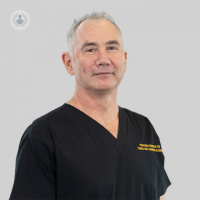How to reduce allergy and asthma-related back-to-school anxiety
Written by:Returning to school can be a stressful time for patients (and their families) who suffer from food allergies, severe hay fever (allergic rhinitis) or asthma. Added to these concerns is the risk posed by the coronavirus COVID-19 pandemic.
With good planning, returning to school should be made much easier for you and your child. Learn anxiety-reducing steps regarding your child’s safe return to school, as explained by Professor George Du Toit, a leading London paediatric allergist.

Steps to take as your child returns to school
1. Allergy diagnosis
Before attending school, ensure your child has a thorough allergy diagnosis. It should be completely certain as to which food allergies they have and what food needs to be avoided.
Any severe air allergies should also have a thorough diagnosis. Some air allergens can be unique to the school environment, and more intense depending on the season of the year:
- Mould (it may be that older school buildings are high in mould and in autumn, mould levels are typically higher)
- Pollen
- Chalkdust
- Allergen dander
- Dust mites
2. Communicate specific topics with school staff
Before your child attends school, you should:
- Be aware of what the school policies are.
- Know where the school would store your child’s emergency medications.
- Know which staff members are trained in identifying attacks and administering medication.
- Know what the emergency plan would be in the event of an allergic reaction or asthma attack.
While it’s easy to avoid common food allergens that are well-recognised throughout the catering industry (e.g. peanuts), it’s more difficult to avoid frequently used ingredients such as eggs and milk. It becomes even more difficult to avoid rarer allergens such as pea and lentils. Therefore, it’s wise to discuss any unique allergies that your child needs to avoid, particularly if school catering provides your child with food.
If your child has exercise-induced asthma you may wish to discuss a plan with the physical education teachers and sports coaches. Many children respond well to taking a salbutamol inhaler 15 minutes before exercise.
Insect sting allergies
An additional allergic trigger in the autumn can be insect stings. Generally, wasp stings rates are slightly higher in the autumn but thankfully, allergies to wasp and bee stings are rare in children in the UK.
Is COVID an extra high risk for allergy and asthma patients?
Returning to school in autumn is associated with viral infections, related chest infections and asthma exacerbations (also called asthma attacks). There is very little data that the COVID-19 infection is a significant risk for asthma attacks, but most viral infections can induce asthma attacks, so caution is necessary.
The risk of getting sick from COVID-19 may be higher for patients with moderate to severe asthma, and patients requiring immunosuppressant therapies for asthma control e.g. frequent oral steroid courses.
Fortunately, the evidence for COVID spread amongst children, especially younger children, is either lower than the rest of the population or at least not much higher.
For continuously updated and reliable information on school children’s risk of coronavirus at school, please access the UK government guidance and support page on education and childcare.
Is your child suffering from allergies or asthma? Learn how your child can benefit from Professor George Du Toit’s leading paediatric patient care.


